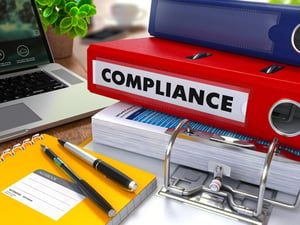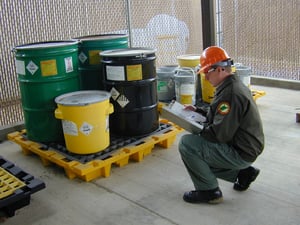Hazardous waste disposal companies shoulder a critical responsibility, adhering to strict environmental regulations and ensuring that your company remains compliant.
If your business generates hazardous waste, it’s important to do your homework when it comes to choosing a disposal company to transport and dispose of your waste safely. Yet with many disposal companies operating in the state of California, distinguishing the best from the rest can be challenging.
A hazardous waste disposal company that diligently follows these best practices won’t only help you remain compliant but will also help ensure that your waste management is handled with the highest standards of safety, environmental responsibility, and operational excellence.
Compliance With Regulatory Standards
Compliance with regulatory standards is the cornerstone of operations for hazardous waste disposal companies. Make no mistake, navigating a landscape overseen by several key regulatory bodies is complex.
no mistake, navigating a landscape overseen by several key regulatory bodies is complex.
The Environmental Protection Agency (EPA) is a pivotal federal authority setting stringent regulations governing hazardous waste management. The Resource Conservation and Recovery Act (RCRA) determines many extensive requirements encompassing the generation, storage, transportation and disposal of hazardous waste as well.
Alongside these federal mandates, California has additional specific regulations, some of which are more strict than federal regulations (such as the state’s e-waste laws). In addition to disposal, several guidelines exist for the safe storage, transportation and treatment of hazardous waste.
Non-compliance can lead to severe repercussions, from legal penalties and fines to operational interruptions. Following these regulations meticulously is critical for hazardous waste disposal companies.
Important best practices include following evolving regulations to ensure compliance, engaging with industry associations, and collaborating with regulatory agencies to remain informed about emerging changes.
Employee Training And Safety Protocols
When looking for a partner who will handle your company’s hazard waste disposal, it’s important to look for a business that prioritizes the best practice of continuous employee training with an emphasis on safety.
The significance of this training extends beyond compliance with regulations, emphasizing the creation of a workforce adept at identifying hazards, understanding procedures and responding effectively in diverse operational scenarios.
These protocols encompass a range of stringent measures to mitigate risks associated with hazardous materials. They outline step-by-step procedures for handling, storing, transporting and disposing of hazardous waste to minimize potential dangers to employees and the environment.
Rigorous adherence to these protocols ensures a safer work environment while mitigating the likelihood of accidents, spills or environmental contamination incidents.
The best commercial hazardous waste disposal companies will also help you implement training programs at your business that are tailored for the handling of hazardous materials. These programs should delve into the intricacies of identifying hazardous materials, understanding their properties and implementing appropriate handling techniques.
They also should cover the use of personal protective equipment (PPE), emergency response procedures and the proper use of containment measures. Continuous education and training in these domains empower your employees to execute their roles with precision, ensuring compliance with regulations and maintaining a high standard of safety.
Proper Waste Disposal
It should go without saying that the best practice of a hazardous waste disposal company should be proper waste disposal. However, the complexity and diversity of hazardous materials make this practice more challenging than it appears.
disposal. However, the complexity and diversity of hazardous materials make this practice more challenging than it appears.
Hazardous waste encompasses a wide variety of materials, each with its own unique properties and characteristics that necessitate specialized handling, treatment and disposal methods. From corrosive chemicals to flammable substances and toxic compounds, each material demands its own customized approach to ensure its safe and responsible disposal.
The evolving nature of waste streams, emerging contaminants and advancements in technology continually challenge disposal companies to adapt and innovate their disposal methods as well. Techniques that were once considered acceptable or compliant in the past might no longer meet current regulatory standards or align with the best practices for environmental protection.
While proper waste disposal might seem self-evident, it’s critical to work with a disposal company that continually invests in innovation and adherence to updated hazardous waste disposal regulations. This ensures that the disposal methods employed not only meet the current legal requirements but also uphold the highest standards of environmental stewardship and public safety.
Secure Transportation And Storage Practices
Recognizing the intrinsic risks associated with transporting hazardous waste, ensuring the safe transit of these materials becomes paramount.
Transporting hazardous waste demands any measures that help mitigate potential risks. Some of the best practices a waste disposal company can do to ensure safe transportation is to use specialized vehicles equipped with containment systems and adhere to designated transport routes and schedules.
Proper packaging and labeling of hazardous waste are also critical components of safe transportation. Packaging materials must be robust enough to withstand transportation without leaks or spills. Clear and accurate labeling identifies the contents and associated risks.
The best disposal companies also prioritize effective storage practices, working with you to ensure hazardous materials are stored safely on your property as well. Storage facilities should comply with state and federal guidelines by including containment measures and secondary spill prevention systems. Regular inspections and maintenance are imperative to identify and address potential vulnerabilities proactively.
Environmentally-Responsible Disposal Methods
Implementing environmentally responsible disposal methods must be a continual best practice in order to reflect a commitment to ecological stewardship while effectively managing hazardous materials.
commitment to ecological stewardship while effectively managing hazardous materials.
By focusing on sustainable practices, disposal companies contribute to the preservation of natural resources, reduction of pollution and mitigation of long-term environmental risks associated with hazardous materials.
It’s also important for a hazardous waste disposal company to offer you disposal options that meet your own sustainability goals. Hazardous waste disposal companies often have a range of disposal options at their disposal, including treatment, recycling and final disposal methods. Treatment processes, such as chemical neutralization or incineration, aim to reduce the hazardous nature of waste. Recycling initiatives extract useful components from hazardous materials, diverting them from traditional disposal methods. Final disposal, whether through secure landfills or other approved means, ensures the safe containment of materials that cannot be treated or recycled.
Harmful waste disposal companies actively contribute to a sustainable future by emphasizing environmentally responsible disposal methods.
Documentation And Record-Keeping
Accurate documentation and record-keeping are critical best practices for hazardous waste disposal companies. The importance of maintaining detailed records throughout the disposal process cannot be overstated since it serves as a cornerstone for demonstrating compliance with regulations, ensuring accountability and providing a transparent trail of the waste’s lifecycle.
Essential records and documentation include waste identification and characterization details, transportation manifests, treatment or recycling records, disposal receipts and comprehensive logs documenting each step of the waste’s journey.
These records not only satisfy regulatory requirements but also facilitate traceability and accountability in case of audits or inquiries.
Companies often implement robust strategies to maintain organized records and compliance logs. This involves the establishment of structured protocols for documentation, ensuring that personnel follow standardized procedures for recording and updating information at every stage of waste management. Regular audits and checks serve as quality control measures to verify the accuracy and completeness of records, addressing discrepancies promptly to maintain integrity.
Embracing digital solutions has become integral for efficient record-keeping in hazardous waste disposal as well. Digital platforms and software streamline the documentation process, offering features like real-time data entry, automated record generation and secure storage of electronic documents. These solutions not only enhance accuracy and accessibility but also enable easier retrieval of information, simplifying reporting and compliance efforts.
Continuous Improvement And Innovation
Encouraging a culture of continuous improvement serves as a guiding principle for hazardous waste disposal companies striving to evolve and excel in their operations.
Fostering an environment that values innovation and improvement enables companies to adapt to changing regulatory landscapes, technological advancements and emerging best practices. It also encourages employees to propose and implement ideas for enhancing operational efficiency, safety protocols and environmental sustainability.
Innovation plays a pivotal role in bolstering safety, efficiency, and sustainability within the hazardous waste disposal sector. New approaches and methodologies not only improve the safety of personnel handling hazardous materials but also optimize processes to reduce waste, minimize environmental impact and enhance resource utilization.
Through fostering a culture of continuous improvement, embracing technological advancements and leveraging innovation, hazardous waste disposal companies can position themselves at the forefront of evolving practices.
As you consider working with a hazardous waste disposal company, look for a partner that embraces this proactive approach to not only elevate its operational standards but also contributes significantly to the advancement of your business and industry as a whole.


Comment